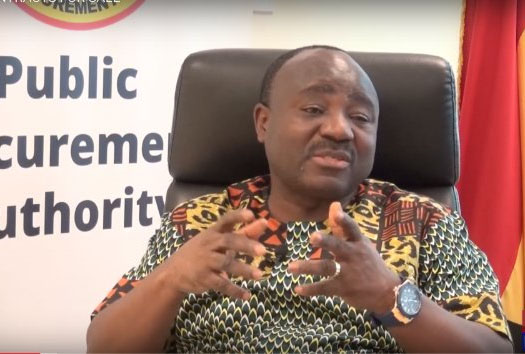Adjenim Boateng Adjei
THE COMMISSION on Human Rights and Administrative Justice (CHRAJ) has directed the former Chief Executive Officer (CEO) of the Public Procurement Authority (PPA), Adjenim Boateng Adjei, to refund to the state, an amount of GHȼ5,611,530 within six months.
The anti-graft body said the money represents “the unexplained wealth” deposited into Mr. Adjei’s account.
In its latest findings following a petition submitted to it by Ghana Integrity Initiative (GII) on October 4, 2019 after the “Contract for Sale” exposé, the commission also banned Boateng Adjei from holding public office for the next 10 years.
It wants him to declare his assets in accordance with the Public Office Holder (Declaration of Assets and Disqualification) Act, 1998 (Act 550) within three months of the date of CHRAJ’s decision.
The petitioner, GII, has since commended CHRAJ for a “dispassionate and thorough work done” and called on the Office of Special Prosecutor (OSP) and the Economic and Organised Crime Office (EOCO) to fast track the criminal investigations aspect of the case involving Mr. Adjei.
The GII said where culpability is established, the law should be made to go its full length to serve as a deterrent to all public officials entrusted with the responsibility of providing public service and managing our national resources.
Mr. Adjei has been found culpable by CHRAJ for allowing his “personal interest to conflict with the performance of his public functions” as the boss of PPA.
CHRAJ, in its latest report, is said to have indicated that the ex-PPA boss’ interest in Talent Discovery Limited (TDL), a company with less than three years’ experience, won considerable public contracts and sold them without informing the awarding entity.
CHRAJ again found Dr. Emmanuel Yaw Boakye, who was a member of the PPA Board, blamable for conflict of interest by taking part in a decision of the PPA Board on the Ministry of Education’s request to use single source procurement method to acquire 160 Kantanka pickup vehicles from the Kantanka Automobile Limited in 2019, whilst a member of the Kristo Asafo Group of Companies.
The GII, in a statement jointly signed by its Executive Director, Linda Ofori-Kwafo and Programmes Manager, Mary Awelana Addah, indicated that it had no doubt that, if enforcement and compliance of the various accountability laws and sanctions are effectively implemented, Ghana would be able to save most of the resources lost to corruption.
Petition
Pursuant to Article 218 of the 1992 Constitution and Section 7 of the CHRAJ Act, 1993 (Act 456), GII petitioned CHRAJ to conduct investigations into possible breaches of the provisions of Chapter 24 of the 1992 Constitution in respect of Mr. Adjenim Boateng Adjei.
In the petition, GII made the following allegations and requested CHRAJ to investigate among others that Adjenim Boateng Adjei and the other members of the PPA Board were allegedly involved in corruption, conflict of interest, collusion and inappropriate conduct in violation of the constitution and laws of Ghana for which appropriate sanctions should be applied.
Unexplained Wealth
The CHRAJ report revealed that between August 2017 and August 2019, huge sums of cash deposits were made into Mr. Adjei’s accounts at the Universal Merchant Bank (UMB) amounting to GHȼ5,697,530.
It said out of the total deposit made into the account, the ex-PPA boss was able to explain the sources of only GHȼ 86,000, and therefore directed Mr. Adjei to refund to the state, the amount of GHȼ5,697,530 less the GHȼ86,000.
Board Collusion
CHRAJ said the PPA Board failed to enforce its own resolution on recusal of the CEO anytime TDL was involved in any application before the board.
It indicated that even though this is not evidence of collusion, the non-enforcement of the board’s resolution could be a contributory factor to Mr. Adjei’s abuse of his office and his persistent conflicting interest.
The board was indicted for failing to implement Section 86 of the Public Procurement Act, 2003 (Act 663) which requires the board to put in place a Code of Conduct to address; conflict of interest in procurement; measures to regulate matters concerning personnel responsible for procurement; declarations of interest in particular procurements; and screening procedures among others.
By Ernest Kofi Adu


